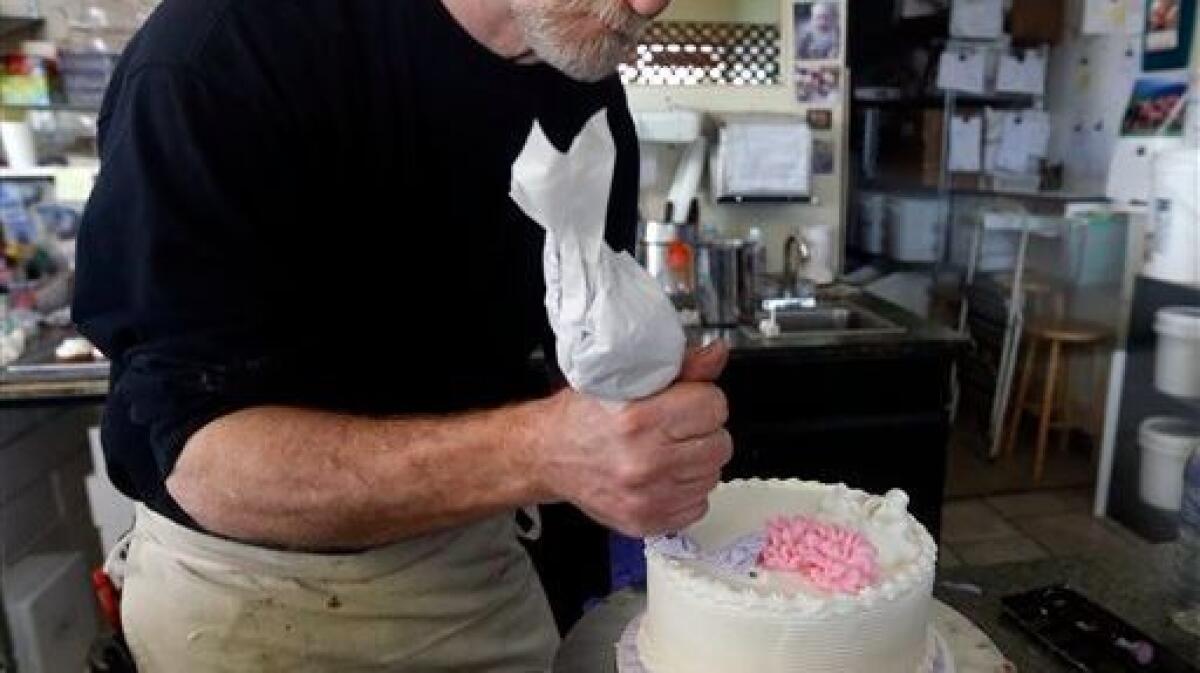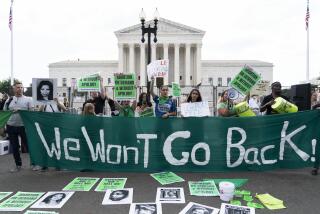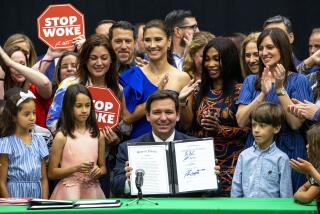Op-Ed: Corporations keep claiming ‘We the People’ rights. And they’re winning

The most high-profile case the Supreme Court will decide this term involves a Colorado bakery that refused to sell a wedding cake to a same-sex couple. Masterpiece Cakeshop Ltd. is hardly the first for-profit corporation to claim a constitutional right to refuse to do business with unwanted customers. But in the era of Citizens United, with the Supreme Court increasingly sympathetic to claims of corporate “personhood,” the bakery has a much better chance of winning than it would have had in the past.
The long history of corporations claiming the same constitutional rights as “We the People” stretches back over two centuries. The court has sometimes resisted, but in fits and starts, business’s persistence has paid off. Today companies have almost the same rights as you and me, and they use those rights to challenge laws regulating business and the economy.
Ever-expanding liberty rights for corporations make it harder for our elected representatives to regulate business for the public good.
More than a century ago, the Supreme Court first considered whether corporations could pick and choose their customers. The corporation that ran Tanforan Racetrack, in San Bruno, later home of the legendary Seabiscuit, challenged a California law requiring places of public amusement to admit anyone with a valid ticket. The track, which had an exclusive deal to sell a particular racing form, wanted to keep out the publisher of a competing guide.
The Supreme Court in those days was in the midst of the notoriously business-friendly Lochner era — named after a case striking down a law that had capped the number of hours bakers could be made to work each week. The Lochner court overturned scores of laws curbing business, including federal child labor laws, minimum wage laws and zoning laws. Corporations flooded the courts with constitutional claims.
And yet, despite their clear pro-business leanings, the justices of the Lochner era had limits. They held that corporations had “property” rights but not “liberty” rights.
Businesses needed basic protections for their property and assets, the court said. If corporations had no property rights, the reasoning went, government could take a company’s factories or buildings to build a park without having to pay any compensation. But corporations did not have liberty rights — the rights associated with autonomy, conscience or political freedom.
Applying this principle, the Supreme Court refused to grant corporations the right against self-incrimination. Corporations, unlike people, were not subject to the coercion that right was designed to prevent. Nor did corporations have a constitutional right to spend money on elections. According to a lower court in 1916, the right to influence elections belonged to “natural and not artificial persons.”
The corporation in the Tanforan Racetrack case insisted that its 1st Amendment rights to associate with only those whom it wanted at the track “were as sacred as those of the citizen at his fireside.” Should the court require the company to admit the rival racing-form producer it would be like allowing “the newspaper reporter to force his way into a private reception and against the wish of the host.”
The Supreme Court wasn’t persuaded. California, the justices explained, had the clear authority to regulate businesses open to the public “for the well-being, comfort, and good order of the people.” Moreover, the corporation was claiming a liberty right protected by the Constitution only for “natural, not artificial persons.”
The Lochner court’s distinction between property rights and liberty rights couldn’t withstand the concerted efforts of corporations to challenge it. It was weakened by a number of decisions, particularly when news-media corporations won somewhat unique freedom of speech rights. An important turning point came in 1978: In a 5-4 decision, the court held that corporations had the same free speech right as individuals to spend money on ballot-measure campaigns.
The majority opinion was written by Justice Lewis Powell Jr., who only months before joining the court in 1971 had written an influential memorandum for the U.S. Chamber of Commerce outlining a strategy for the political mobilization of corporate America. A response to Ralph Nader and the growing consumer rights and environmental movements, the Powell Memorandum is often credited with inspiring businesses to become more vocal in public policy debates.
Corporations would use their widening liberty rights, especially freedom of speech, to overturn laws that required graphic tobacco warnings, disclosure of hormones in dairy products, and that restricted advertising practices.
Nonetheless, for another 30 years the distinction between natural and artificial persons continued to block corporate spending in candidate campaigns — until Citizens United vs. Federal Election Commission. Holding that corporations have the same free speech right as individuals to spend their money to influence candidate elections, the Supreme Court’s controversial 2010 decision was the logical result of Powell’s 1978 decision.
And now Masterpiece Cakeshop is seeking even broader 1st Amendment rights, permitting it to discriminate against same-sex couples. The claim is that a custom wedding cake is a form of expression deserving free speech protection: If the cakemaker doesn’t want to make a cake for two men who are getting married, he shouldn’t have to.
Ever-expanding liberty rights for corporations make it harder for our elected representatives to regulate business for the public good. If the court sides with Masterpiece Cakeshop, states like Colorado that believe that civic equality is only possible if businesses that serve the public are open to everyone will be hamstrung in their efforts. Florists, invitation printers, dressmakers, caterers and makeup artists could all claim the goods they provide are as deserving of protection as a wedding cake.
If today’s Supreme Court disagrees with the Lochner era justices about the Constitution’s stand on unwanted customers, same-sex couples will see their rights diminish in the marketplace. The rights of corporations, on the other hand, will be secure.
Adam Winkler is a professor of law at UCLA. His latest book is “We the Corporations: How American Businesses Won Their Civil Rights.”
Follow the Opinion section on Twitter @latimesopinionand Facebook
More to Read
A cure for the common opinion
Get thought-provoking perspectives with our weekly newsletter.
You may occasionally receive promotional content from the Los Angeles Times.






